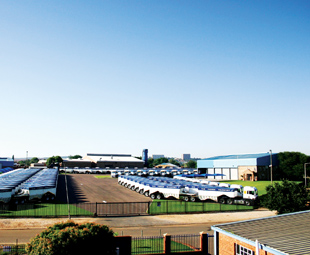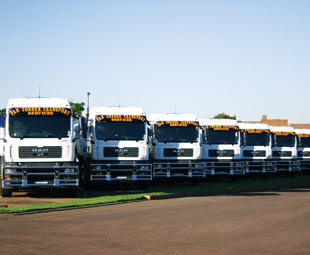A legacy begins

The Van Tonder brothers have built South Africa’s biggest specialised bulk grain transport operation from the ground up: it all began in 1989 with just one truck and within two decades has grown to a fleet of over 50. The Pretoria premises of Van Tonder Transport Services are impressive. Brothers Flippie and Danie bought their first truck whilst still living on their parents’ Kuruman farm in the Northern Cape. Today, with their dedicated MAN fleet, they run a seamless operation that is a model transport business.
“The secret to any successful transport operation is good management,” says Flippie van Tonder, director of logistics. “Because we run such a tightly managed operation we can conduct regular, thorough tests on each vehicle in our fleet.”
And the brothers make their success look almost effortless. What began as a side business in transport soon outgrew the local Kuruman market, and by 1998 Van Tonder Transport Services had relocated to Gauteng to cater for the agriculturally-rich Vaal triangle.
“We were hardly a big operation, even when we arrived in Gauteng,” admits Danie van Tonder, workshop and maintenance director. “We were renting a tiny workshop in Meyersdal.” However, the brothers’ knowledge of the grain market, their good contacts, a firm reputation for reliability and the decline of rail transport gradually led to the growth of Van Tonder Transport Services as it is today.
“All grain traders have their own logistics departments, but most do not own their own fleets,” explains Flippie. “We fulfil the role of transporter between the farms, traders and mills for some of the biggest names in the business.”
Rather than spread itself too thin, Van Tonder Transport Services has chosen to concentrate on a few choice clients. “Often, we are loaded only for one direction of a trip,” Flippie explains. “We don’t over-extend ourselves. Reliable service and catering for our customers’ needs are more important than how many loads we run each day.”
Reliability is the cornerstone of the operation. “One of the reasons we are so successful in this market is the decline of rail transport,” he admits. “As things stand, rail is far from reliable and mills cannot afford to run out of feedstock because of transport inconsistencies. If a mill isn’t working it’s losing money, so it depends on daily grain deliveries being on time. Road transport is reliable, which is more important than price in this sector.” According to Flippie, the larger mills in South Africa process between 500 and 1 000 t of feedstock every day.
Let’s talk about MAN
Although Van Tonder Transport Services did not begin as a dedicated MAN operator, over the years other makes of vehicle have been replaced with MAN trucks: initially by F2000s, and now with 480 hp TGAs.
 “We have tested a lot of trucks over the years, but without a doubt MAN is the leader when it comes to our specific application,” Flippie states confidently. “MAN trucks are the most fuel-efficient and they offer the lowest tare weight, which is very important to us.”
“We have tested a lot of trucks over the years, but without a doubt MAN is the leader when it comes to our specific application,” Flippie states confidently. “MAN trucks are the most fuel-efficient and they offer the lowest tare weight, which is very important to us.”
If we look at the daily activities of Van Tonder Transport Services, the majority of trucks in the fleet are loaded with 38 t of grain three times a day. Trips are short and limited to the Vaal triangle, with only a few trucks running longer distances. The average truck in the Van Tonder fleet does 13 000 km a month, which makes the operation very different from that of a long haul transporter.
“Our greatest concern is loading as much weight as possible within legal parameters, at the lowest cost-per-kilometre, or cpk,” explains Flippie.
According to the logistics director, this means keeping the entire rig to as low a weight as possible. “TGAs not only offer a lower tare than any other trucks on the market; our trucks are designed for us to specification and shipped from Germany to be assembled here. We need our trucks to be as light as possible.”
But it’s not just about the TGA’s weight. It’s also about reliability.
“We have an extremely good relationship with MAN,” explains Danie. “Ours is a very customer-focused organisation. The MAN team understands the requirements of our sector and our focus on low tare weight. They work closely with us to ensure that we achieve our goals.”
This includes matching each job to the right truck and supporting Van Tonder Transport Services in its decision to run an on-site MAN certified workshop.
“We hold parts to the value of between three and four million rands in our store at any given time,” explains Danie. This includes fast-moving engine parts, gearboxes, axles and even cabs.
“If we have everything in stock, it’s quick and easy to get a truck back onto the road – assuming we ever have a breakdown,” he says. In fact, something of which the Van Tonder brothers are especially proud is the fact that breakdowns so rarely occur. Changing parts according to distance travelled rather than waiting for something to break means that Van Tonder Transport’s trucks simply do not break down – which, of course, reinforces their reputation for complete reliability.
Running an entirely MAN fleet also helps. With 12 F2000s still in their stable and 40 TGAs, there can only be two versions of many of the larger components that Danie needs to keep in stock. And the older F2000 MAN models are still going strong, despite being between six and eight years old, each with more than one million kilometres below its belt. Nevertheless, they will soon be replaced with new TGAs.
The complete package
In addition to lighter trucks, the Van Tonders’ trailers are all chassis-less and manufactured by Trailord from ultra-light Swedish steel.
“We worked with Trailord to design a chassis-less trailer that operates along a sluice design,” explains Danie. “Although our trailers need to be as light as possible, strength and durability are also important.”
The result is a double-binned grain carrier made of 1.2 mm thick Ducal Swedish steel. “Ducal is ten times thinner (and therefore lighter) than local steel while also being incredibly strong,” says Flippie. The chassis-less design allows for the bins to slope, while sluices at the bottom of the slopes can empty the bins in a matter of minutes with no labour needed other than the truck’s driver.
“But we don’t only save weight on the trailer,” he continues. “All 52 of our trucks and trailers are fitted with aluminium Alcoa rims.” A significant investment, if the cost of Alcoa rims is compared with ordinary wheels; yet the brothers insist that buying Alcoa actually means saving money.
“The weight-saving gained from fitting only Alcoa rims allows us to load an additional
300 kg per trip,” explains Flippie. “This translates into a saving of R4 000 per truck per month. The rims have paid for themselves within two years; after that, it’s clear profit.”
In addition, aluminium rims offer less rolling resistance and displace heat more effectively, resulting in longer tyre life and better fuel efficiency.
As with everything else in their operation, the brothers are loyal to one tyre manufacturer as well. “We only run on Michelin tyres,” says Danie. “We sell our old casings to Bandag and replace any worn tyres with new treads, never re-treads.”
Van Tonder Transport Services is committed to good tyre maintenance. “Tyres are not only a safety issue, but they are extremely important to the overall cost of a transport business,” explains Danie. “Not only do tyres that are properly inflated and monitored have better life expectancies; they also increase a truck’s fuel efficiency.”
The Van Tonders also encourage their drivers to take an interest in the maintenance of their truck tyres. “Every weekend, we check each and every tyre,” elaborates Danie. “If a tyre’s pressure is not perfect, it affects that driver’s performance bonus. All our drivers are offered incentive packages to keep their trucks in optimal running order. If this is not achieved, the bonus is reduced.”
Optimal performance of each and every vehicle is all part of an ordinary day’s work at Van Tonder Transport.
Published by
Focus on Transport
focusmagsa



